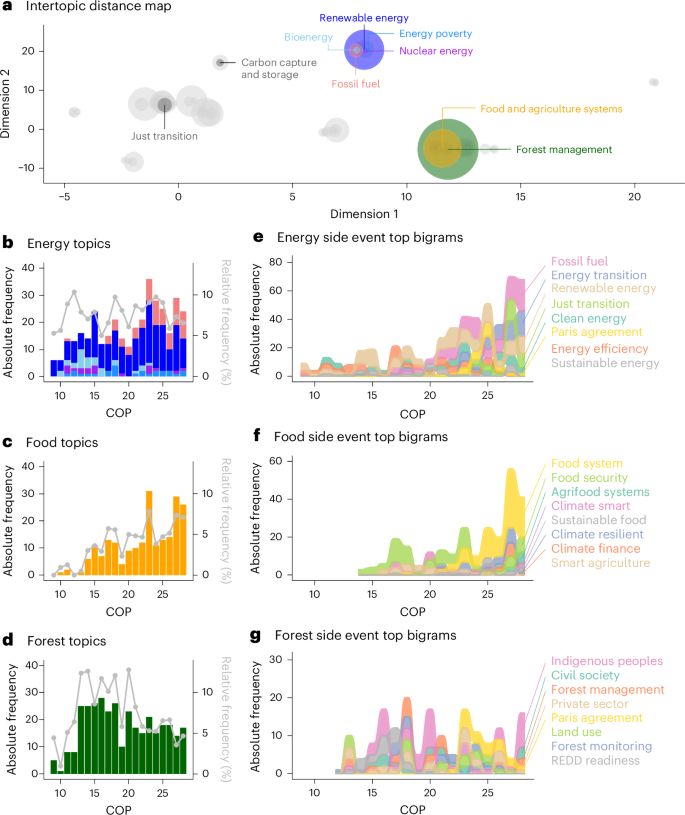Tracing inclusivity at UNFCCC conferences through side events and interest group dynamics
IF 29.6
1区 地球科学
Q1 ENVIRONMENTAL SCIENCES
引用次数: 0
Abstract
Inclusivity and transparency are the foundations of procedural justice in climate governance. However, concerns persist around the influence of business interest groups at United Nations Framework Convention on Climate Change (UNFCCC) Conferences of Parties (COPs). COPs have increased in size and complexity, obscuring agendas and organizational relationships. Here we analyse the discourse and networks of actors at COP side events from 2003 to 2023 using machine learning-based topic modelling and social network analysis. We trace how discussions on energy, food and forests have evolved. Focusing on energy topics, we show that fossil fuel lobbyists gain COP access through developed-country business non-governmental organizations (NGOs) and developing-country governments. Their nominators focus on renewable energy and system approaches but are peripheral in the anti-fossil fuel discourse which grew from a collaborative network of environmental NGOs. Despite data availability challenges, systematically tracing the inclusivity of COP processes can uncover power dynamics at the highest levels of climate governance. Side events of annual UNFCCC Conferences of Parties are one of several channels by which non-state actors influence climate negotiation. By analysing discourse and networks of actors, this research examines how topics evolve over time and how energy interest groups gain access to agenda setting.


通过会外活动和利益集团动态追踪《联合国气候变化框架公约》会议的包容性
包容性和透明度是气候治理程序公正的基础。然而,在《联合国气候变化框架公约》(UNFCCC)缔约方会议(cop)上,商业利益集团的影响仍然令人担忧。缔约方会议的规模和复杂性都有所增加,使议程和组织关系变得模糊。在这里,我们使用基于机器学习的主题建模和社会网络分析,分析了2003年至2023年COP会外事件中参与者的话语和网络。我们追溯了关于能源、粮食和森林的讨论是如何演变的。以能源议题为重点,我们表明化石燃料游说者通过发达国家商业非政府组织(ngo)和发展中国家政府获得COP准入。他们的提名人专注于可再生能源和系统方法,但在反化石燃料话语中处于边缘地位,这种话语是从环保非政府组织的合作网络中发展起来的。尽管存在数据可用性方面的挑战,但系统追踪缔约方会议进程的包容性可以揭示气候治理最高层的权力动态。
本文章由计算机程序翻译,如有差异,请以英文原文为准。
求助全文
约1分钟内获得全文
求助全文
来源期刊

Nature Climate Change
ENVIRONMENTAL SCIENCES-METEOROLOGY & ATMOSPHERIC SCIENCES
CiteScore
40.30
自引率
1.60%
发文量
267
审稿时长
4-8 weeks
期刊介绍:
Nature Climate Change is dedicated to addressing the scientific challenge of understanding Earth's changing climate and its societal implications. As a monthly journal, it publishes significant and cutting-edge research on the nature, causes, and impacts of global climate change, as well as its implications for the economy, policy, and the world at large.
The journal publishes original research spanning the natural and social sciences, synthesizing interdisciplinary research to provide a comprehensive understanding of climate change. It upholds the high standards set by all Nature-branded journals, ensuring top-tier original research through a fair and rigorous review process, broad readership access, high standards of copy editing and production, rapid publication, and independence from academic societies and other vested interests.
Nature Climate Change serves as a platform for discussion among experts, publishing opinion, analysis, and review articles. It also features Research Highlights to highlight important developments in the field and original reporting from renowned science journalists in the form of feature articles.
Topics covered in the journal include adaptation, atmospheric science, ecology, economics, energy, impacts and vulnerability, mitigation, oceanography, policy, sociology, and sustainability, among others.
 求助内容:
求助内容: 应助结果提醒方式:
应助结果提醒方式:


